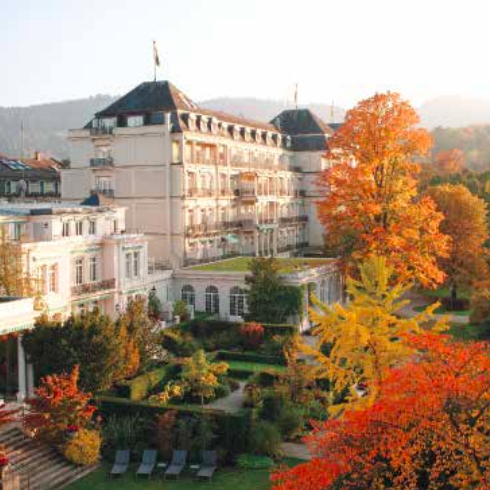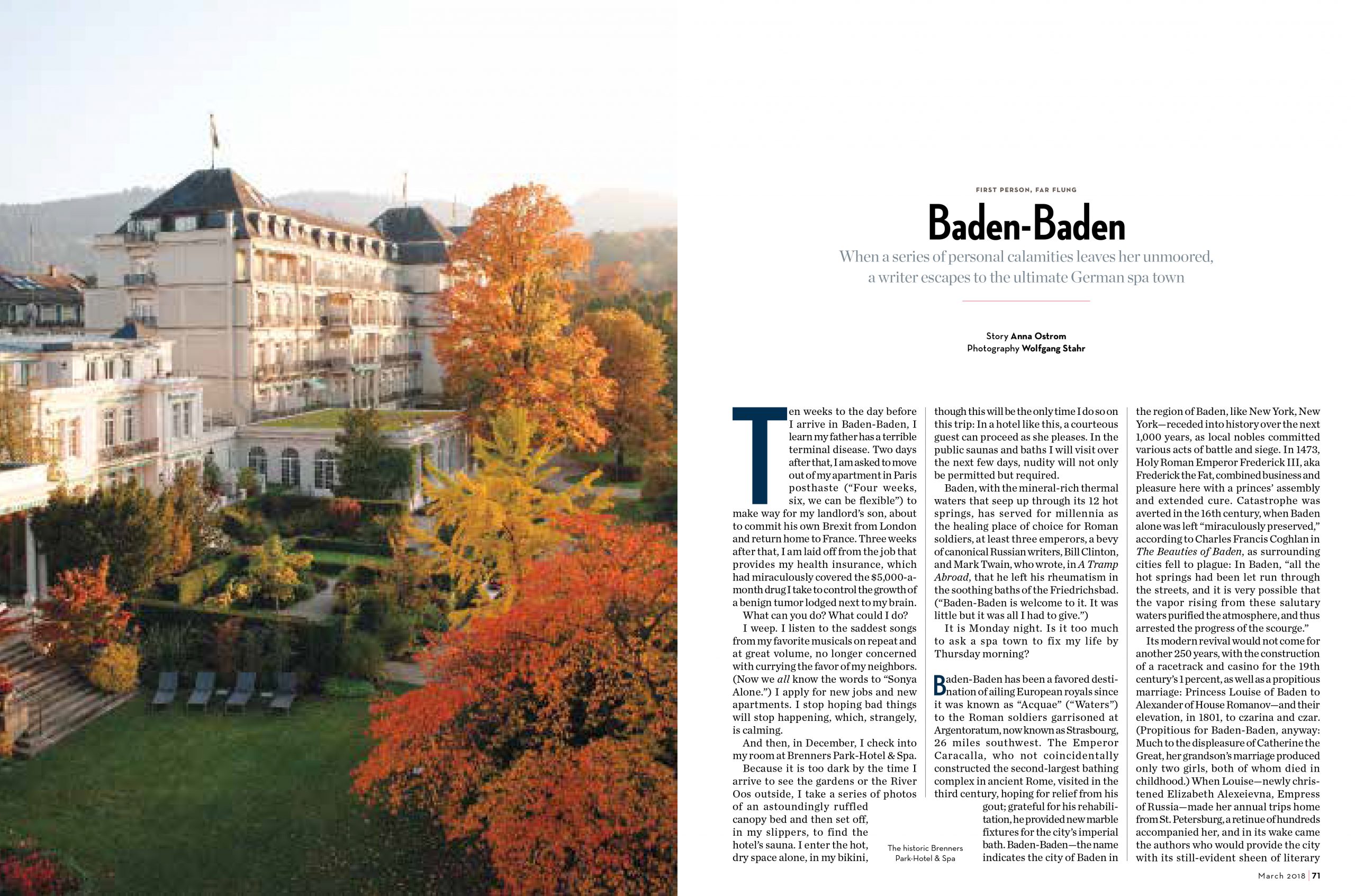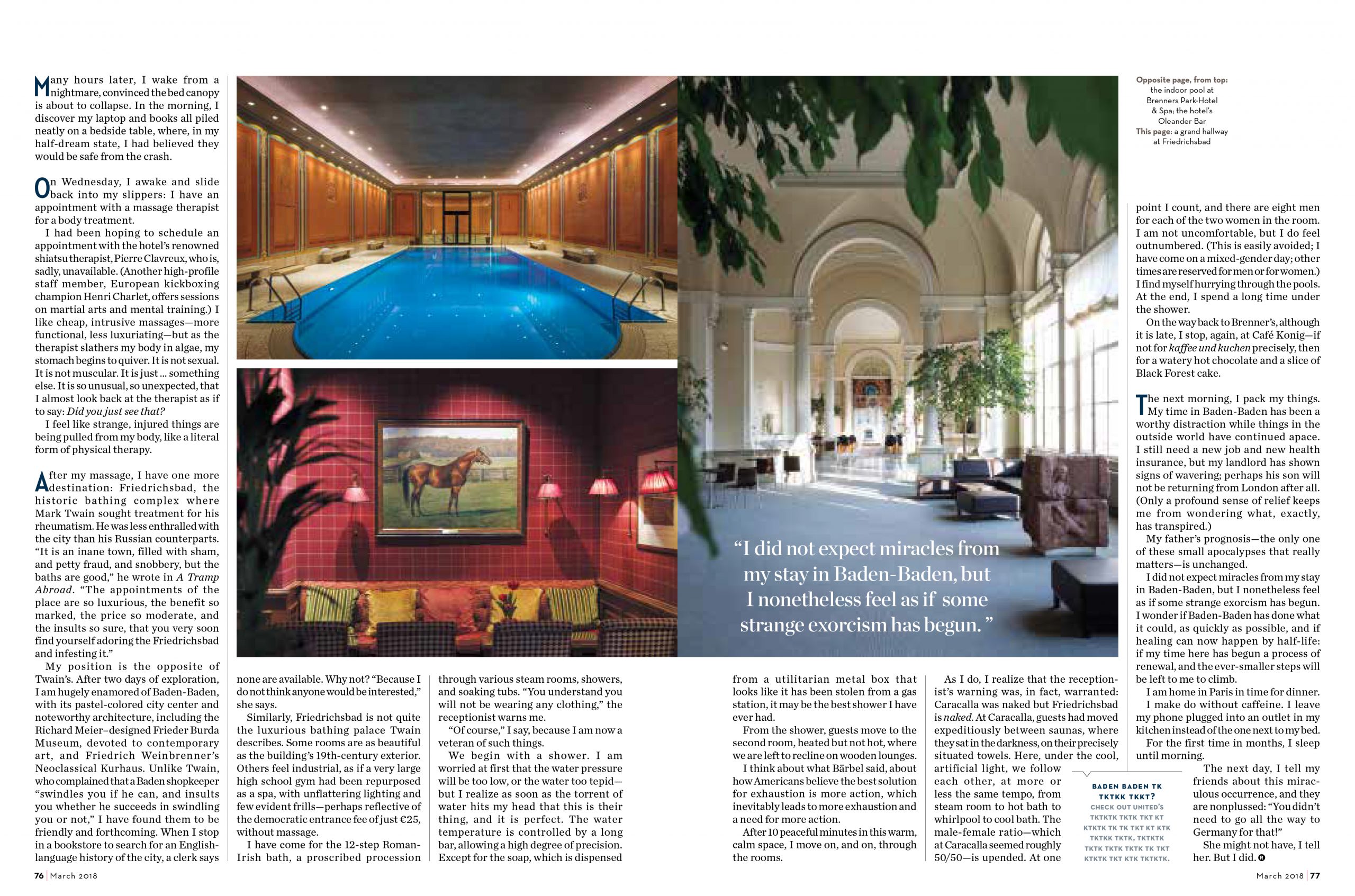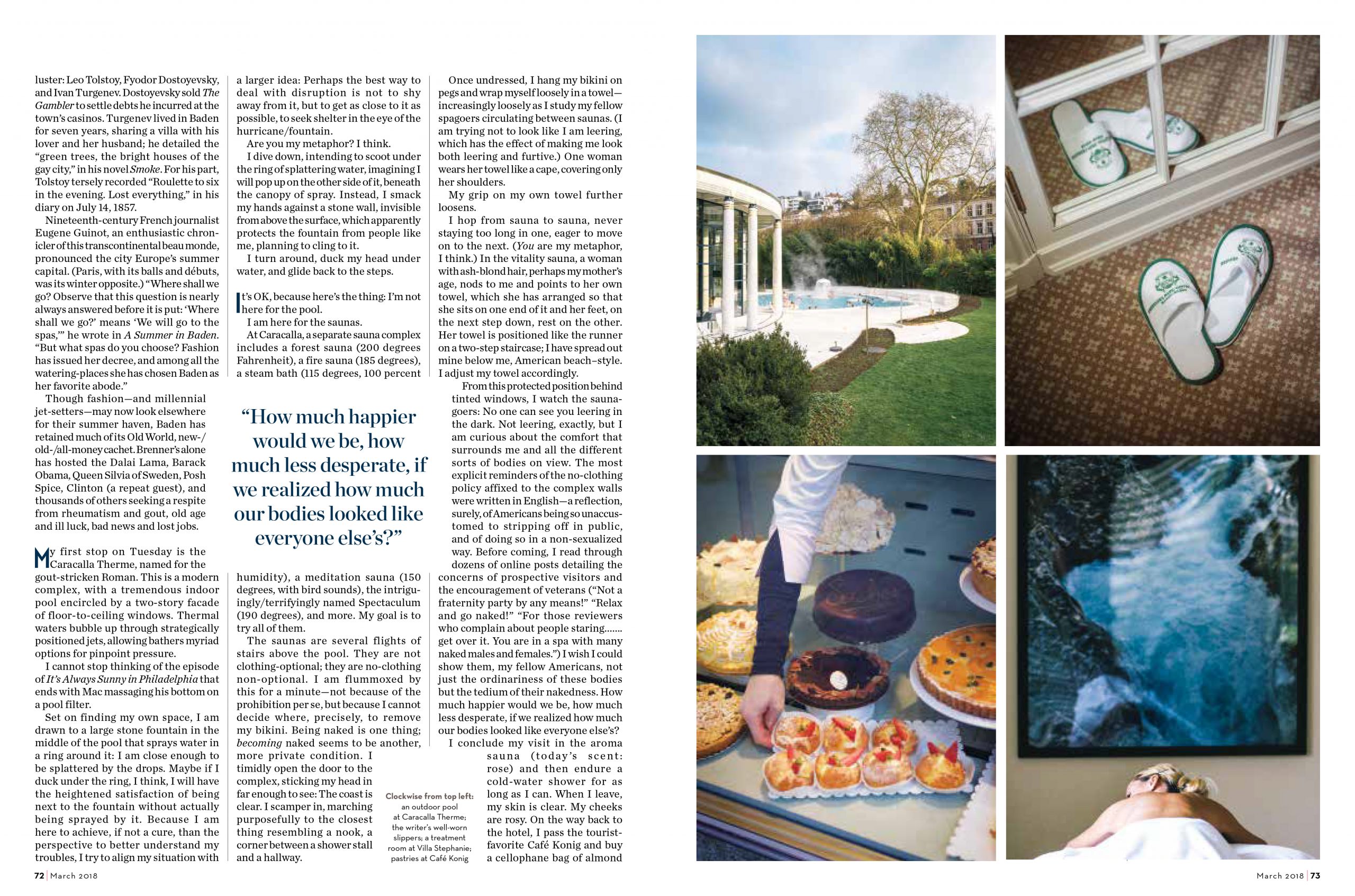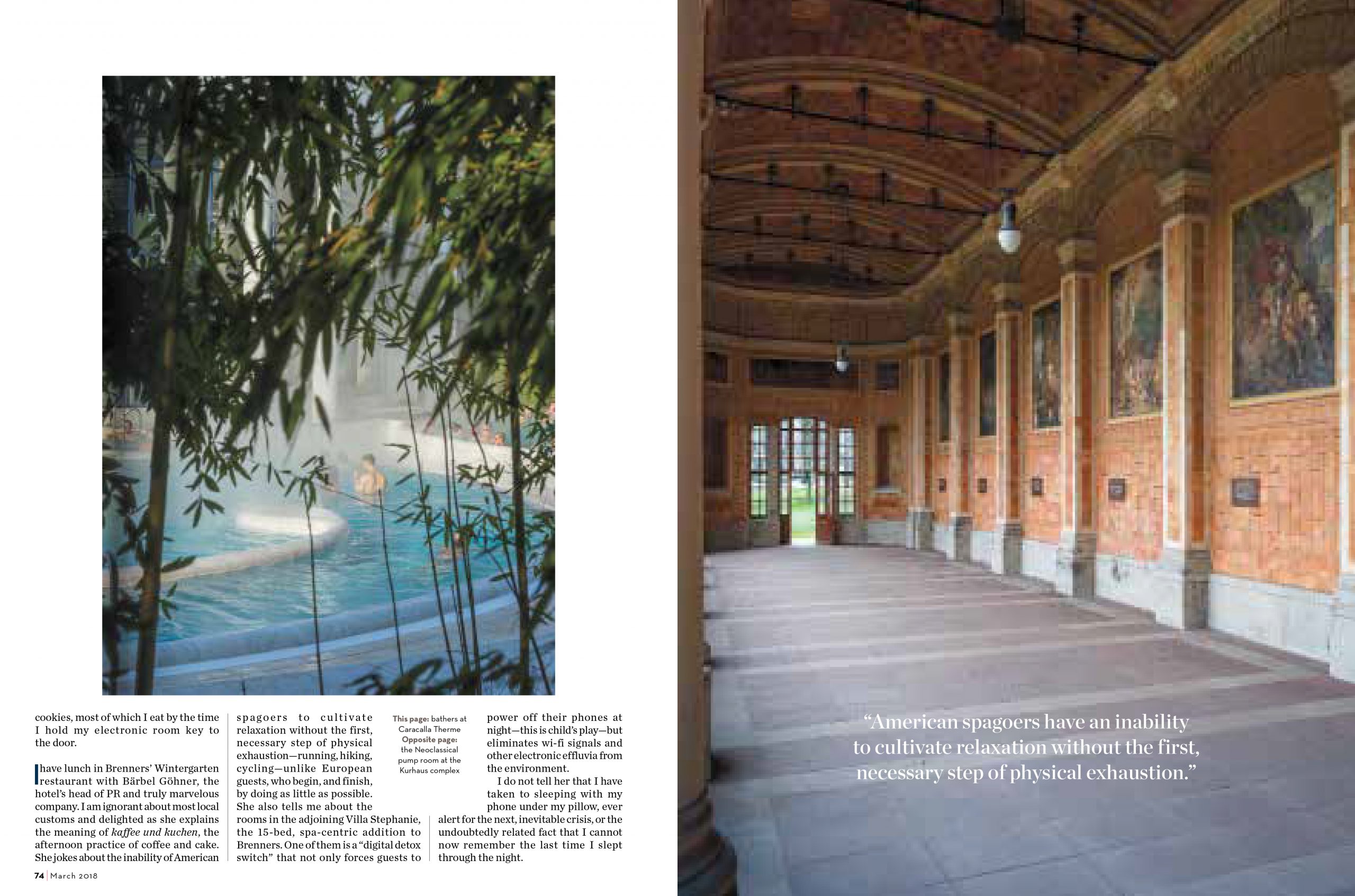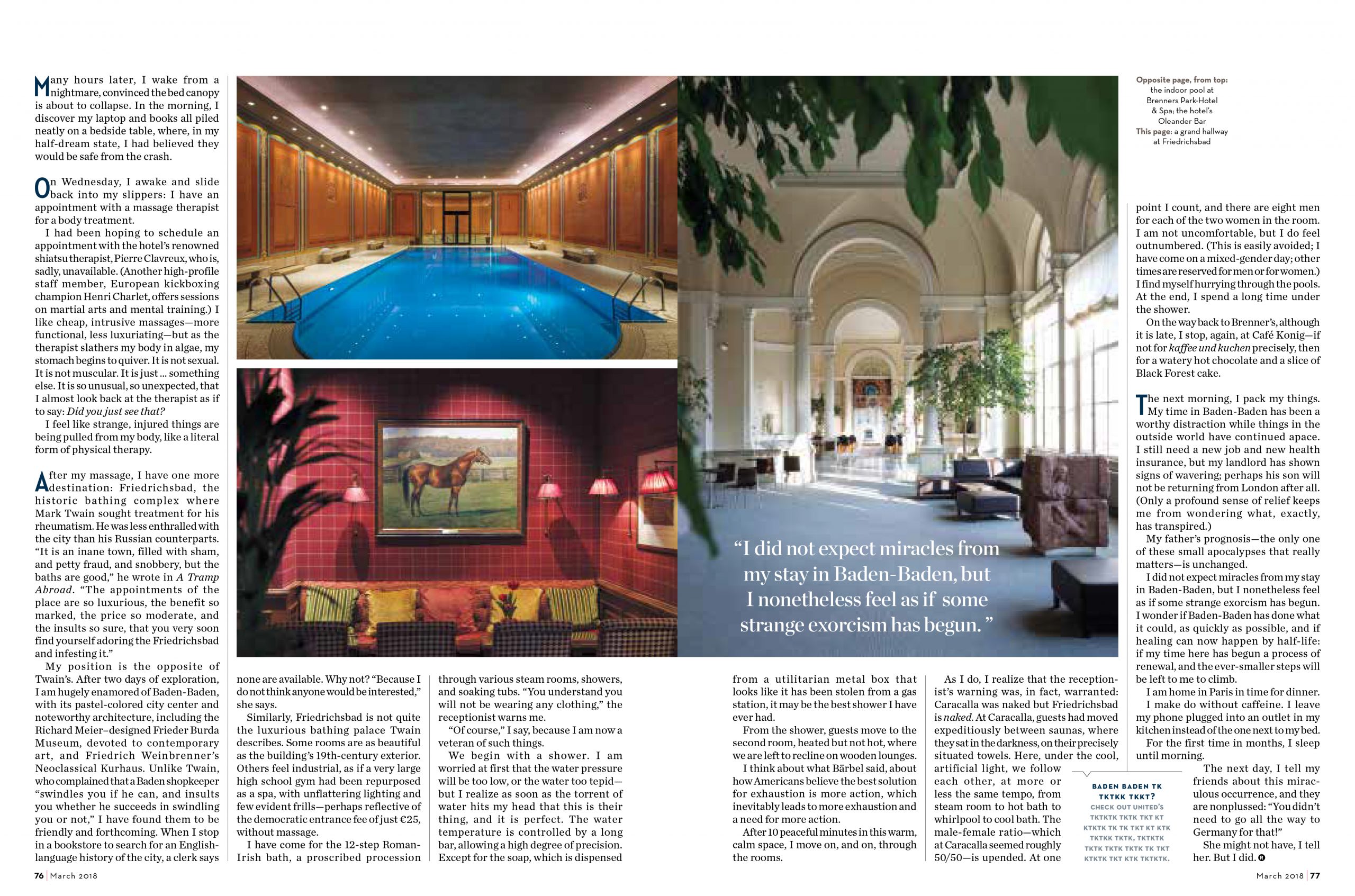Baden Baden for United’s Hemispheres: Ten weeks to the day before I arrive in Baden-Baden, I learn my father has a terminal, terrible disease. Two days after that, I am asked to move out of my apartment in Paris posthaste (“Four weeks, six, we can be flexible”) to make way for my landlord’s son, about to commit his own Brexit from London and return home to France. Three weeks after that, I am laid off from the job that provides my health insurance, which had, miraculously, uniquely, covered the $5,000-a-month drug I take to control the growth of a tumor lodged next to my brain.
What can you do? What could I do?
I weep. I listen to the saddest songs from my favorite musicals on repeat and at great volume, no longer concerned with currying the favor of my neighbors. (Now we all know the words to “Sonja Alone.”) I apply for new jobs and new apartments. I stop hoping bad things will stop happening, which, strangely, is calming.
And then, two months after the start of this cascading series of calamitous events, I check into my room at Brenners Park-Hotel & Spa.
Because it is too dark by the time I arrive to see the gardens or the River Oos outside, I take a series of photos of an astoundingly ruffled canopy bed and then set off, in my slippers, to find the hotel’s sauna. I enter the hot, dry space alone, in my bikini, though this will be the only time I do so on this trip: In a hotel, especially a hotel like this, a courteous guest can proceed as she pleases. In the public saunas and baths I will visit over the next few days, nudity will be not only permitted but required.
It is Monday night.
Baden, with the mineral-rich thermal waters that seep up through its 12 hot springs, has served, for millennia, as the healing place of choice for Roman soldiers, at least three emperors, a bevy of canonical Russian writers, Bill Clinton, and Mark Twain, who wrote, in A Tramp Abroad, that he had left his rheumatism in the soothing baths of the Friedrichsbad. (“Baden-Baden is welcome to it. It was little but it was all I had to give.”)
Is it too much to ask a spa town to fix my life by Thursday morning?
* * *
Baden-Baden has been a favored destination of ailing European royals since it was known as “Acquae” (“Waters”) to the Roman soldiers garrisoned at Argentoratum, now known as Strasbourg, 26 miles southwest. The Emperor Caracalla, who not coincidentally constructed the second-largest bathing complex in ancient Rome, visited here in the third century, hoping for relief from his gout; grateful for his rehabilitation, he provided new marble fixtures for the city’s imperial bath. Baden-Baden — the name indicates the city of Baden in the region of Baden, like New York-New York — recedes into history over the next 1000 years, as local nobles committed various acts of battle and siege. In 1473, Holy Roman Emperor Frederick III, a.k.a. Frederick the Fat, combined business and pleasure here with a princes’ assembly and extended cure. Catastrophe was averted in the 16th century, when Baden alone was left “miraculously preserved,” according to Charles Francis Coghlan in The Beauties of Baden, as surrounding cities fell to plague: In Baden, “all the hot springs had been let run through the streets, and it is very possible that the vapor rising from these salutary waters purified the atmosphere, and thus arrested the progress of the scourge.”
Its modern revival would not come for another 250 years, with the construction of a racetrack and casino for the 19th century’s one-percent, as well as a propitious marriage: Princess Louise of Baden to Alexander of House Romanov — and their elevation, in 1801, to czarina and czar. (Propitious for Baden-Baden, anyway: Much to the displeasure of Catherine the Great, her grandson’s marriage produced only two girls, both of whom died in childhood.) When Louise — newly christened Elizabeth Alexeievna, Empress of Russia — made her annual trips home from St. Petersburg, a retinue of hundreds accompanied her, and in its wake came the authors who would provide the city with its still-evident sheen of literary luster: Leo Tolstoy, Fyodor Dostoyevsky, and Ivan Turgenev. Dostoyevsky sold The Gambler to settle debts he incurred at the town’s casinos. Turgenev lived in Baden for seven years, sharing a villa with his lover and her husband; he detailed the “green trees, the bright houses of the gay city,” in his novel Smoke. For his part, Tolstoy tersely recorded “Roulette to six in the evening. Lost everything” in his diary on July 14, 1857.
Nineteenth-century French journalist Eugene Guinot, an enthusiastic chronicler of this transcontinental beau monde, pronounced the city Europe’s summer capital. (Paris, with its balls and débuts, was its winter opposite.) “Where shall we go? Observe that this question is nearly always answered before it is put: ‘Where shall we go?’ means ‘We will go to the spas,’” he wrote in A Summer in Baden. “But what spas do you choose? Fashion has issued her decree, and among all the watering-places she has chosen Baden as her favorite abode.”
Though fashion, and millennial jetsetters, may now look elsewhere for their summer haven, Baden has retained much of its Old World, new-/old-/all-money cachet. Brenner’s alone has hosted Dalai Lama, Barack Obama, Queen Silvia of Sweden, Posh Spice, Clinton (a repeat guest), and thousands of others seeking a respite from rheumatism and gout, old age and ill luck, bad news and lost jobs.
* * *
My first stop on Tuesday morning is the Caracalla Therme, named for the gout-stricken Roman. This is a modern complex, with a tremendous indoor pool encircled by a two-story facade of floor-to-ceiling windows. Thermal waters bubble up through strategically positioned jets, allowing bathers myriad options for pinpoint pressure.
I cannot stop thinking of the episode of It’s Always Sunny in Philadelphia that ends with Mac massaging his bottom on a pool filter.
Set on finding my own space, I am drawn to a large stone fountain in the middle of the pool, which sprays water in a ring around it: I am close enough to be splattered by the drops. Maybe if I duck under the ring, I think, I will have the heightened satisfaction of being next to the fountain without actually being sprayed by it. Because I am here to achieve if not a cure than the perspective to better understand my own troubles, I try to align my situation with a larger idea: Perhaps the best way to deal with disruption is not to shy away from it, but to get as close to it as possible, to seek shelter in the eye of the hurricane/fountain.
Are you my metaphor? I think.
I dive down, intending to scoot under the ring of splattering water, imagining I will pop up on the other side of it, beneath the canopy of spray. Instead, I smack my hands against a stone wall, invisible from above the surface, which apparently protects the fountain from people like me, planning to cling to it.
I turn around, duck my head under water, and glide back to the steps.
* * *
It’s OK because here’s the thing: I’m not here for the pool.
I am here for the saunas.
At Caracalla, a separate sauna complex includes a forest sauna (200 degrees Fahrenheit), fire sauna (185 degrees), a steam bath (115 degrees, 100 percent humidity), the meditation sauna (150 degrees, with bird sounds), the intriguingly/terrifyingly named Spectaculum (190 degrees), and more. My goal is to try all of them.
The saunas are several flights of stairs above the pool. It is not clothing optional. It is no-clothing non-optional. I am flummoxed by this for a minute — not because of the prohibition per se, but because I cannot decide where, precisely, to remove my bikini. Being naked is one thing; becoming naked seems to be another, more private condition. I timidly open the door to the complex, sticking my head in far enough to see: The coast is clear. I scamper in, marching purposefully to the closest thing resembling a nook, a corner between a shower stall and a hallway.
Once undressed, I hang my bikini on pegs and wrap myself loosely in a towel — increasingly loosely as I study my fellow spa-goers as they circulate between saunas. (I am trying not to look like I am leering, which has the effect of making me look both leering and furtive.) One woman wears her towel like a cape, covering only her shoulders.
My grip on my own towel further loosens.
I hop from sauna to sauna, never staying too long in one, eager to move on to the next. (You are my metaphor, I think.) In the vitality sauna, a woman with ash-blond hair, perhaps my mother’s age, nods to me and points to her own towel, which she has arranged so that she sits on one end of it and her feet, on the next step down, rest on the other. Her towel is positioned like the runner on a two-step staircase; I have spread out mine below me, American beach-style. I adjust my towel accordingly.
From this protected position behind tinted windows, I watch the sauna-goers: No one can see you leering in the dark. Or not leering, exactly — but I am curious, about the comfort that surrounds me, and all the different sorts of bodies on view. The most explicit reminders of the no-clothing policy affixed to the complex walls were written in English — a reflection, surely, of the fact that we Americans are so unaccustomed to stripping off in public, and of doing so in a non-sexualized way. Before coming, I had read through dozens of online posts detailing the concerns of prospective visitors and the encouragement of veterans (“Not a fraternity party by any means!” “Relax and go naked!” “For those reviewers who complain about people staring…….get over it. You are in a spa with many naked males and females.”) I wish I could show them, my fellow Americans, not just the ordinariness of these bodies but the tedium of their nakedness. How much happier would we be, how much less desperate, if we realized how much our bodies looked like everyone else’s?
I conclude my visit in the aroma sauna (today’s scent: rose) and then endure a cold-water shower for as long as I can. When I leave, my skin is clear. My cheeks are rosy. On the way back to the hotel, I pass the famous, tourist-favorite Café Konig, and buy a cellophane bag of almond cookies, most of which I eat by the time I hold my electronic room key to the door.
* * *
I have lunch in Brenners’ Wintergarten restaurant with Bärbel Göhner, the hotel’s head of PR. Usually these meals, a required element in covering a hotel like this, are interminable rituals of mutual obligation. Bärbel, though, is the exception to prove the rule, and marvelous company. I am ignorant about most local customs and delighted as she explains the meaning of “kaffee und kuchen,” the afternoon practice of coffee and cake. (We also discuss recycling, veganism, the politics of the 2013 Matt Damon film Elysium, and the inability of American spa-goers to cultivate relaxation without the first, necessary step of physical exhaustion — running, hiking, cycling — unlike European guests, who begin, and finish, by doing as little as possible.)
Bärbel details the amenities of the rooms in the adjoining Villa Stephanie, the 15-bed, spa-centric addition to Brenners. One of them is a “digital detox switch” that not only forces guests to power off their phones at night — this is child’s play — but eliminates wifi signals and other electronic effluvia from the environment.
I do not tell her that I have taken to sleeping with my phone under my pillow, ever alert for the next, inevitable crisis, or the undoubtedly related fact that I cannot now remember the last time I slept the night through.
* * *
Many hours later, I wake up from a nightmare, convinced my bed’s canopy is about to collapse. In the morning, I discover my laptop and books all piled neatly on a bedside table, where, in my half-dream state, I had believed they would be safe from the crash.
* * *
On Wednesday I awake and slide back into my slippers: I have an appointment with a massage therapist for a body treatment.
I had been hoping to schedule an appointment with the hotel’s renowned shiatsu therapist, Pierre Clavreux, who is, sadly, unavailable. (Another high-profile staff member, European kickboxing champion Henri Charlet, offers sessions on martial arts and mental training.) I like cheap, intrusive massages — more function, less luxuriating — but as the massage therapist slathers my body in algae, my stomach begins to quiver. It is not sexual. It is not muscular. It is just … something else. It is so unusual, so unexpected, that I almost look back at the therapist as if to say: Did you just see that?
I feel like strange, injured things are being pulled from my body, like a literal form of physical therapy.
* * *
After my massage, I have one more destination: Friedrichsbad, the historic bathing complex where Mark Twain sought treatment for his rheumatism. He was less enthralled with the city than his Russian counterparts. “It is an inane town, filled with sham, and petty fraud, and snobbery, but the baths are good,” he wrote in A Tramp Abroad. “The appointments of the place are so luxurious, the benefit so marked, the price so moderate, and the insults so sure, that you very soon find yourself adoring the Friederichsbad and infesting it.”
My position is rather opposite of Twain’s. After two days of exploration, I am hugely enamoured of Baden-Baden, with its pastel-colored city center and noteworthy architecture, including the Richard Meier-designed Frieder Burda Museum, devoted to contemporary art, and Friedrich Weinbrenner’s neoclassical Kurhaus. Unlike Twain, who complained that Baden shopkeeper “swindles you if he can, and insults you whether he succeeds in swindling you or not,” I have found them to be friendly and forthcoming. When I stop in a bookstore to search for an English-language history of the city, a clerk says none are available. Why not? “Because I do not think anyone would be interested,” she says.
Similarly, Friedrichsbad is not quite the luxurious bathing palace Twain describes. Some rooms are as beautiful as the building’s 19th-century exterior. Others feel industrial, as if a very large high school’s gym had been repurposed as a spa, with unflattering lighting and few evident frills — perhaps reflective of the democratic entrance fee of just €25, without massage.
I have come for the 12-step Roman-Irish bath, a proscribed procession through various steam rooms, showers, and soaking tubs. “You understand you will not be wearing any clothing,” the receptionist warns me.
“Of course,” I say, because I am now a veteran of such things.
We begin with a shower. I am worried at first that the water pressure will be too low, or the water too tepid — but I realize as soon as the torrent of water hits my head that this is what they do; this is their one thing, and it is perfect. The water temperature is controlled by a long bar, allowing a high degree of precision. Except for the soap, which is dispensed from a utilitarian metal box that looks like it has been stolen from a gas station, it may be the best shower I have ever had.
From the shower, guests move to the second room, heated but not hot, where we are left to recline on wooden lounges.
I think about what Bärbel said, about how Americans believe the best solution for exhaustion is more action, which inevitably leads to more exhaustion, and a need for more action.
After 10 peaceful minutes in this warm, calm space, I move on, and on, through the rooms.
As I do, I realize that the receptionist’s warning was, in fact, warranted: Caracalla was naked but Friedrichsbad is naked. At Caracalla, guests had moved expeditiously between saunas, where they sat in the darkness, on their precisely situated towels. Here, under the cool, artificial light, we follow each other, at more or less the same tempo, from steam room to hot bath to whirlpool to cool bath. The male-female ratio — which at Caracalla seemed roughly 50/50 — is upended. At one point I count, and there are eight men for each of the two women in the room. I am not uncomfortable. I do feel outnumbered. (This is easily avoided; I have come on a mixed-gender day; other times are reserved for men or for women.)
Toward the end, I find myself hurrying through the pools. At the end, I spend a long time under the shower.
On the way back to the hotel, although it is late, I stop, again, at Café Konig — if not for kaffee und kuchen precisely, then for a watery hot chocolate and a slice of Black Forest cake.
* * *
The next morning, I pack my things. My time in Baden-Baden has been a worthy distraction while things in the outside world have continued apace. I still need a new job, and new health insurance, but my landlord has shown signs of wavering; perhaps his son will not be returning from London after all. (Only a profound sense of relief keeps me from wondering what, exactly, has transpired here.)
My father’s prognosis — which is, after all, the only one of these small apocalypses that matters — is unchanged.
I did not expect miracles from my stay in Baden-Baden, but I nonetheless feel as if some strange exorcism has begun. I wonder if Baden-Baden has done what it could, as quickly as possible, and if healing can now happen by half-life: if my time here has begun a process of renewal, and the ever-smaller steps will be left to me to climb.
I am home in Paris in time for dinner.
I make do without caffeine. I leave my phone plugged into an outlet in my kitchen instead of the one next to my bed.
For the first time in months, I sleep until morning.
The next day, I tell my friends about this miraculous occurrence, and they are nonplussed: “You didn’t need to go all the way to Germany for that!”
She might not have, I tell her. But I did.
